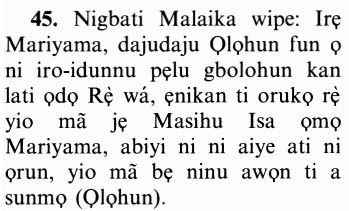3vs45
Select any filter and click on Go! to see results
إِذْ قَالَتِ الْمَلآئِكَةُ يَا مَرْيَمُ إِنَّ اللّهَ يُبَشِّرُكِ بِكَلِمَةٍ مِّنْهُ اسْمُهُ الْمَسِيحُ عِيسَى ابْنُ مَرْيَمَ وَجِيهاً فِي الدُّنْيَا وَالآخِرَةِ وَمِنَ الْمُقَرَّبِينَ
Ith qalati almalaikatu ya maryamu inna Allaha yubashshiruki bikalimatin minhu ismuhu almaseehu AAeesa ibnu maryama wajeehan fee alddunya waalakhirati wamina almuqarrabeena
Index Terms
Click to play
Yoruba Translation

Hausa Translation
A lõkacin da malã´iku suka ce "Yã Maryamu! Lalle ne Allah Yana bã ki bushãra da wata kalma daga gare Shi sũnansa Masĩhu ĩsa ɗan Maryama, yana mai daraja a dũniya da Lãhira kuma daga Makusanta.
Asbabu n-Nuzuul (Occasions of Revelation)
Delivering the Good News to Maryam of `Isa's Birth
This Ayah contains the glad tidings the angels brought to Maryam that she would give birth to a mighty son who will have a great future.
Allah said,
إِذْ قَالَتِ الْمَلآئِكَةُ يَا مَرْيَمُ إِنَّ اللّهَ يُبَشِّرُكِ بِكَلِمَةٍ مِّنْهُ ...
(Remember) when the angels said: "O Maryam! Verily, Allah gives you the glad tidings of a Word from Him,
a son who will come into existence with a word from Allah, `Be', and he was.
According to the majority of the scholars, this is the meaning of Allah's statement (about Yahya) مُصَدِّقًا بِكَلِمَةٍ مِّنَ اللّهِ (Believing in the Word from Allah) (3:39).
... اسْمُهُ الْمَسِيحُ عِيسَى ابْنُ مَرْيَمَ ...
His name will be Al-Masih, `Isa, the son of Maryam,
and he will be known by this name in this life, especially by the believers.
`Isa was called "Al-Masih'' (the Messiah) because when he touched (Mash) those afflicted with an illness, they would be healed by Allah's leave.
Allah's statement, عِيسَى ابْنُ مَرْيَمَ (`Isa, the son of Maryam),
relates `Isa to his mother, because he did not have a father.
... وَجِيهًا فِي الدُّنْيَا وَالآخِرَةِ وَمِنَ الْمُقَرَّبِينَ ﴿٤٥﴾
Held in honor in this world and in the Hereafter, and will be one of those who are near to Allah.
meaning, he will be a leader and honored by Allah in this life, because of the Law that Allah will reveal to him, sending down the Scripture to him, along with the other bounties that Allah will grant him with.
`Isa will be honored in the Hereafter and will intercede with Allah, by His leave, on behalf of some people, just as is the case with his brethren the mighty Messengers of Allah, peace be upon them all.
هذه بشارة من الملائكة لمريم عليها السلام بأن سيوجد منها ولد عظيم له شأن كبير قال الله تعالى " إذ قالت الملائكة يا مريم إن الله يبشرك بكلمة منه " أي بولد يكون وجوده بكلمة من الله أي يقول له كن فيكون وهذا تفسير قوله " مصدقا بكلمة من الله " كما ذكره الجمهور على ما سبق بيانه " اسمه المسيح عيسى ابن مريم " أي يكون هذا مشهورا في الدنيا يعرفه المؤمنون بذلك وسمي المسيح قال بعض السلف : لكثرة سياحته وقيل : لأنه كان مسيح القدمين لا أخمص لهما وقيل : لأنه كان إذا مسح أحدا من ذوي العاهات برئ بإذن الله تعالى وقوله تعالى " عيسى ابن مريم " نسبة إلى أمه حيث لا أب له " وجيها في الدنيا والآخرة ومن المقربين " أي له وجاهة ومكانة عند الله في الدنيا بما يوحيه الله إليه من الشريعة وينزله عليه من الكتاب وغير ذلك مما منحه الله به وفي الدار الآخرة يشفع عند الله فيمن يأذن له فيه فيقبل منه أسوة بإخوانه من أولي العزم صلوات الله وسلامه عليه وعليهم أجمعين .
"إذ قالت الملائكة" أي جبريل "يا مريم إن الله يبشرك بكلمة منه" أي ولد "اسمه المسيح عيسى ابن مريم" خاطبها بنسبته إليها تنبيها على أنها تلده بلا أب إذ عادة الرجال نسبتهم إلى آبائهم "وجيها" ذا جاه "في الدنيا" بالنبوة "والآخرة" بالشفاعة والدرجات العلا "ومن المقربين" عند الله
دليل على نبوتها كما تقدم . " وإذ " متعلقة ب " يختصمون " . ويجوز أن تكون متعلقة بقوله : " وما كنت لديهم " .
I'raab - grammatical analysis of the Qur'an
«إِذْ قالَتِ الْمَلائِكَةُ» إذ بدل من إذ في الآية السابقة والجملة بعدها في محل جر بالإضافة.
«يا مَرْيَمُ» يا أداة نداء مريم منادى علم مبني على الضم.
«إِنَّ اللَّهَ يُبَشِّرُكِ بِكَلِمَةٍ» إن ولفظ الجلالة اسمها وجملة يبشرك خبرها والجار والمجرور متعلقان بيبشرك وجملة «إِنَّ اللَّهَ ...» مقول القول.
«مِنْهُ» متعلقان بمحذوف صفة لكلمة.
«اسْمُهُ الْمَسِيحُ» مبتدأ وخبر.
«عِيسَى» بدل «ابْنُ» صفة أو بدل.
«مَرْيَمُ» مضاف إليه مجرور بالفتحة نيابة عن الكسرة ممنوع من الصرف للعلمية والعجمة. والجملة في محل جر صفة لكلمة.
«وَجِيهاً» حال من كلمة لأنها وصفت.
«فِي الدُّنْيا» متعلقان بوجيها.
«وَالْآخِرَةِ» عطف على الدنيا.
«وَمِنَ الْمُقَرَّبِينَ» متعلقان بمحذوف حال تقديره : ومقدما من المقربين.
